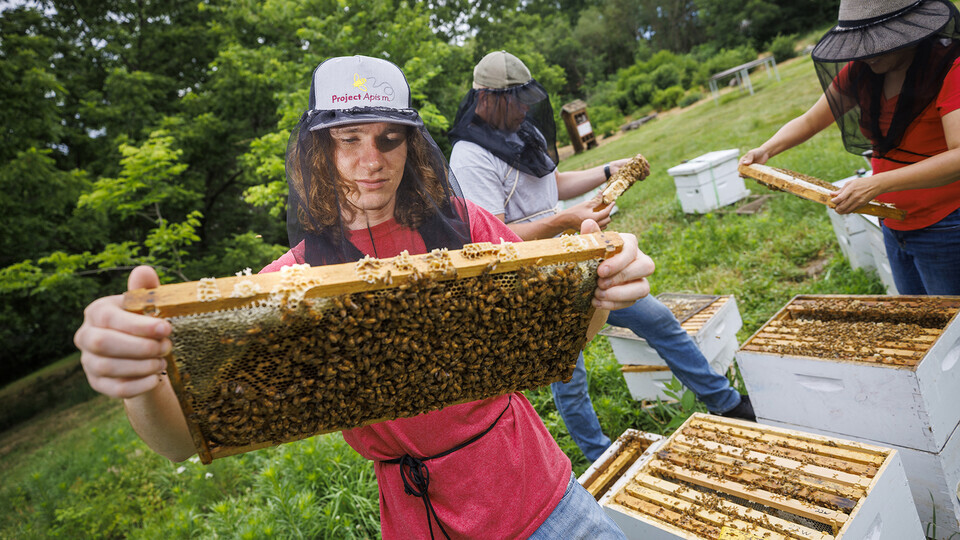
Lincoln, Neb. —A chance encounter led Nebraska’s Rogan Tokach to a longtime passion for honeybees.
While sitting at a county fair, the then-12-year-old from Abilene, Kansas, noticed a beekeeper’s observation hive. His curiosity was piqued.
“At that point, I always knew bees were important, but not to that extent,” Tokach said.
A year later, Tokach had his first hive and unknowingly started a career path.
“I went back every day to try to find the queen,” Tokach said. “I made it into a game.”
Tokach began doing research and participating in 4-H fairs. He sold jars of honey and donated the profits, while earning scholarships.
He earned an undergraduate degree at Kansas State University and is currently a master’s student in entomology at the University of Nebraska–Lincoln. After earning his undergraduate degree, Tokach was eager to work with honeybees professionally and was drawn to the faculty at Nebraska.
Tokach had previously worked as a summer intern for the U.S. Geological Survey on a project headed by Autumn Smart, who had recently been hired by Nebraska U as an assistant professor.
“I had also heard her wife, Dr. (Judy) Wu-Smart, speak multiple times at different beekeeping events,” he said. “Both were already fairly well known within beekeeping circles even though they were both relatively unknown to UNL.
“I reached out to them, excited for the opportunity to potentially enter as a graduate student. Additionally, Dr. Wu-Smart’s Ph.D. work with pesticides was very interesting to me, and I was hoping to work more in that field.”
Tokach has had a hands-on learning experience at Nebraska. He has studied many aspects of honeybees, including what’s affecting their overall success and failure, and is working to see where his research can have the most impact.
“I would say coming to Nebraska was through those connections and interests with Drs. Smart and Wu-Smart,” Rogan said. “When I visited the Bee Lab, they seemed excited to have me there and went through some of the research they were currently working on. I thought the Bee Lab was a great place, and I was interested in continuing my education and learning from them.”
This summer, Tokach has been busy doing field work, visiting several hives across the state. He hatches bees, raises them and studies how two different environments, one of which is polluted with pesticides, impact worker bee behaviors and the overall population.
Craig Chandler | University Communication and Marketing Bees from one of the hives that Tokach monitors.Beginning in 2015, AltEn, an ethanol plant in Mead, began processing pesticide-treated seed that was no longer viable to plant. That same year, the NU Bee Lab started seeing colony failure at its apiary locations in and around the nearby Eastern Nebraska Research and Extension Center, a site where they had successfully kept bees for more 30 years. The plant has since been shut down. However, the area around the plant still shows large-scale environmental pollution.
“My research focuses on the colony impact that those honeybees are experiencing,” Tokach said. “I am monitoring honeybee behavior to see how the bees’ actions and health in the area compare to those at my control site. “I am monitoring to see how the site affects queens in the environment, as well as the workers. If workers show accelerated aging, a problem that can occur when exposed to pesticides, that can have detrimental overall impacts on colony functions and lead to colony failure.”
And, Tokach has been doing his own work with a bee lab team, alternating between observing the queen bee and worker bees’ behavioral tracks.
Upon earning his master’s degree in December, Tockach plans to pursue a doctoral degree at Auburn University with a continued focus on honeybee health. He said he would like to continue his career in the Midwest.
“I hope to contribute research that will help bees in the end,” he said.







